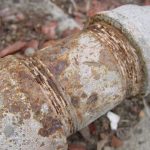Any water
leak can have a devastating effect on your home. Even minor leaks can create major problems if they are left unattended. This can be simple to do if you can see the source of the leak or notice water, but unfortunately, slab leaks can be difficult to detect and eliminate. Here we will explore this topic a little further, so you can determine if your home is at risk of this challenging issue.
Where Slab Leaks Occur:
One of the most challenging issues of slab leaks is that they occur underneath the home. The slab is the term used to describe the concrete foundations of a home. The plumbing of most homes is installed below this slab. This means that when a leak occurs, homeowners tend not to know it since there are no immediately obvious signs. The challenge of a slab leak is they are very difficult to recognize and repair. In may cases, the slab will need to be broken in order to access the water line under the foundation and repair the leak.
Diagnosing a Slab Leak:
There are a number of ways to determine that there is a
slab leak affecting your property. For many homeowners, the most obvious sign is that the water bills suddenly skyrocket. If there are no apparent reasons for an increase over a few billing cycles, it may be that there is a slab leak. In some cases, you may feel dampness if you walk around the ground floor barefoot.
You may also notice that your floors have started to swell. When water moves from the foundation, it can cause the ground to become swollen. This creates unevenness in the foundation, and it causes the floors to lift. You may find that the floors appear to have raised in certain areas of your home.
Finally, you may hear the sound of water running under your home. Plumbers can use specialist listening equipment to check for unusual noises in the foundation. They can pump air into the pipes to see if there are gurgling noises.
The Effects of a Slab Leak:
If a slab leak is diagnosed, it is important that it is repaired immediately. There are a number of detrimental consequences of even a small leak. These consequences include foundation damage. Slab leaks create swelling that causes cracks in the foundation, which require costly repairs. You may also find that your yard can become damaged from a slab leak. Water can build up under the slab, and it will move to the lowest part of your yard. This can cause water to pool and cause flooding and damage to grass and plants. If you have a swimming pool in your yard, it could also be susceptible to damage from this excess water.
Finally, you may find that inside your home is damaged by a slab leak. Your flooring can be damaged, with wooden floors warping and tiles cracking. There is also a risk of mold growth. The damp conditions in the foundation can encourage mold spores. As the damp rises, your drywall can act like a sponge and soak up the moisture. This means that mold can develop inside the walls, which can be a serious risk to health, particularly for those with asthma or other respiratory conditions.
By Giovanni Longo President Flood Brothers Plumbing
Giovanni Longo is a 3rd generation master plumber who has been practicing his craft and trade in the greater Los Angeles area for well over a decade and a half. A plumbing and hydraulics-engineering innovator, Giovanni’s particular world-class expertise focuses on dealing with challenging sewer system designs as well as resolving complex commercial and residential draining issues. As a certified Flood Mitigation expert, he is also well versed in a wide variety of water damage and remediation solutions.





